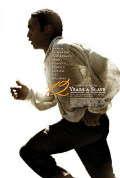
Directed by
Steve McQueen
134 minutes
Rated MA
Reviewed by
Bernard Hemingway

12 Years A Slave
Synopsis: The fact-based story of Solomon Northup (Chiwetel Ejiofor), a free black man from upstate New York who is abducted and sold into slavery in the Deep South during the 1840s.
A long, long way from The Color Purple, let alone Gone With The Wind, 12 Years A Slave gives ample evidence of the degree to which realism has become a non-negotiable requirement of top line productions these days. Based on a first-hand memoir, it is a meticulously authentic-looking re-creation of a true story that spares us nothing of the inhumanity and outright brutality of slavery. The violence depicted is graphic with one scene in particular, the whipping of the female slave Patsey (Lupita Nyong'o), realized with harrowingly palpable force, and a lynching of two anonymous young males also disturbing.
By and large, Steve McQueen and screenwriter John Ridley manage to keep the narrative well above the simplistic and sentimental, condemning the barbarity but also setting it within what was considered acceptable behaviour at the time. The underlying genre conventions and a tendency to state the obvious are however discernible. Chiwetel Ejiofor’s, despite Solomon's pragmatism, tends to be very much Hollywood’s typically nobly-oppressed protagonist; there’s an awkward scene in which co-producer Brad Pitt as a building foreman expiates on the evils of slavery; and the film’s closure is as much pure Oscar-baiting mawkishness as you could want...or not (how did, one wants to ask, Mrs Northup manage to live in such fine style for 12 years?)
The Oscar nominated Ejiofor is commanding in the central role but Michael Fassbender (nominated for Support Actor Oscar and who starred in McQueen’s 2012 film Shame) is outstanding as the volatile and vicious cotton plantation owner, Epps. Why Pitt, or for that matter Paul Giamatti and Paul Dano, who deliver stock characters, were cast is another matter but no doubt marketing came into it. On the other hand Hans Zimmer turns in an effective understated score.
Want something different?





